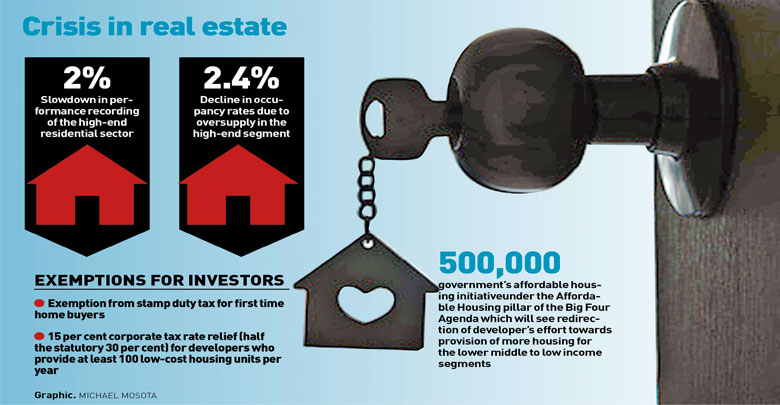Developers set sight on cheap houses as sector fortunes dip

@LewisNjoka
The affordable housing initiative will result in more private real estate developers shifting from targeting high-end buyers to housing the low-and middle-income market segments, experts have said.
Under the Affordable Housing pillar of the Big Four agenda, the government plans to build 500,000 housing units by 2022.
According Cytonn Real Estate Ltd research analyst Jennifer Kendi, incentives from the government towards affordable housing such as the formation of the Kenya Mortgage Refinancing Company, exemption from stamp duty first-time home buyers and 15 per cent corporate tax rate relief for developers who provide at least 100 low-cost housing units per year, will result in more developers moving into the segment.
Kendi says oversupply in the high-end residential sector has resulted in performance slowdown forcing developers to look for options beyond the high-end market segment.
Occupancy rate
“The high-end residential sector has recorded a slowdown in performance recording a two per cent decline in occupancy rates and 2.4 per cent decline in uptake due to the oversupply in the segment. Therefore, the government’s affordable housing initiative to develop 500,000 units by 2022, will redirect developers to the low-and middle-income segments,” says Kendi.
However, Knight Frank managing director Ben Woodhams says the initiative may not have much impact on private real estate developers because they target a different clientele.
“Not many developers are in affordable housing because it has low profit margins. It is difficult to make money in that market segment unless you partner with the government,” says Woodhams.
Small-scale developers in affordable housing could be headed for tougher times due to increased competition.
Erdemann Properties Ltd head of communication Joseph Baraza says small-scale private developers in affordable housing need to partner with the government or risk being kicked out of the business.
“If they do not partner with the government, they will find it very hard to make profits with the increasing competition. Large developers serving the high-end market must also find ways to get into the lower income segment to survive the current tough times in the sector,” says Baraza.
Profit margins in housing the low-and middle-income segments are unattractive.
To attract more developers into the segment, Kendi suggests the government provide incentives such as availing public land for affordable housing projects, facilitate land swaps to make suitable land available for development and guarantee the uptake of the houses by the public.
Provide tax incentives
The government could also provide tax incentives such as exempting construction materials and supplies for use in the affordable housing projects from paying Value Added Tax.
The real estate sector in Kenya is facing several challenges, the main one being inadequate and high costs of funds to both developers and off takers.
“Real estate development is capital-intensive and debt has become increasingly costly in the recent past. Thus, developers have to explore alternative sources of capital,” says Kendi, adding that the actual cost of credit averages 18 per cent per annum due to additional administration fees.
Worse still, the capping of interest on bank loans has resulted in less credit being availed to the real estate sector.
“The rate caps made it more difficult for developers to access credit,” says Woodhams.
Favourable rates
Baraza, however, says developers carrying out large projects were less affected by the caps because they can negotiate better rates.
“If you are handling projects as large as we are, then you can negotiate for favourable rates with your bank,” she says.
Edermann, in partnership with the government is building 3,000 affordable houses in Ngara, Nairobi, a project dubbed River Bank Apartments.
Funding long-term real estate projects is a risky affair with data from Central Bank showing that non-performing loans in the sector rose by 48 per cent to hit Sh44.4 billion by the end of 2018.
To surmount the challenge of accessing affordable credit, Kendi advises developers to explore alternative real estate financing options such as development Real Estate Investment Trusts (Reits) and real estate asset backed securities.















